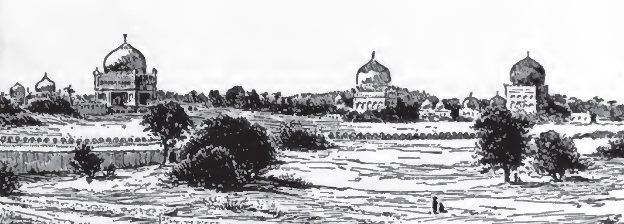

blank page
Among the men of genius whom Mahmud of Ghazni attracted to his court was the great Persian poet Firdausi of Tus in Khorasan (see page 32 above). Firdausi sang in epic strains of the ancient glory of Iran, and Mahmud promised him a thousand gold pieces for every thousand couplets he should compose of the Shah Namah, or “Book of Kings.” This princely assurance called forth from the grateful poet a splendid panegyric which forms part of the invocation that introduces the famous epic. These eulogistic phrases have been rendered into English by Atkinson as follows:
Praise, praise to Mahmud, who of like renown,
In battle or the banquet, fills the throne;
Lord of the realms of Chin and Hindustan,
Sovereign and Lord of Persia and Turan,
With his loud voice he rends the flintiest ear;
On land a tiger fierce, untouched by fear,
And on the wave, he seems the crocodile
That prowls amidst the waters of the Nile.
Generous and brave, his equal is unknown;
In deeds of princely worth he stands alone.
The infant in the cradle lisps his name;
The world exults in Mahmud’s spotless fame.
In festive hours Heaven smiles upon his truth;
In combat deadly as the dragon’s tooth;
Bounteous in all things, his exhaustless hand
Diffuses blessings through the grateful land;
And, of the noblest thoughts and actions, lord;
The soul of Gabriel breathes in every word;
May Heaven with added glory crown his days;
Praise, praise to mighty Mahmud – everlasting praise!
The eulogy unfortunately proved premature. When the great poem of sixty thousand verses was completed, it was presented to Mahmud; but the royal patron, influenced apparently by court intrigue against Firdausi, substituted silver for gold in payment, sending to the poet sixty thousand pieces of the white metal in place of the yellow. Firdausi, disappointed and enraged, rejected the reward with scorn, distributed the moneybags among three servants of the bath where he happened to be when the gift was sent, and gave vent to the venom of his spleen in verses of tremendous invective, stigmatizing Mahmud as base-born and of a spirit ignoble as his birth. The sequel has already been told (page 32), but the stain on the renown of Mahmud of Ghazni will never be removed.
Know, tyrant as thou art, this earthly state
Is not eternal, but of transient date;
Fear God, then, and afflict not human-kind;
To merit Heaven, be thou to Heaven resigned.
Afflict not even the ant; though weak and small,
It breathes and lives, and life is sweet to all.
Knowing my temper, firm, and stern, and bold,
Did’st thou not, tyrant, tremble to behold
My sword blood-dropping ? Had’st thou not the sense
To shrink from giving man like me offence ?
What could impel thee to an act so base?
What, but to earn and prove thy own disgrace ?
Why was I sentenced to be trod upon
And crushed to death by elephants? By one
Whose power I scorn ! Could’st thou presume that I
Would be appalled by thee, whom I defy ?
I am the lion, I, inured to blood,
And make the impious and the base my food;
And I could grind thy limbs, and spread them far
As Nile’s dark waters their rich treasures bear.
Fear thee? I fear not man, but God alone,
I only bow to His Almighty throne.
Inspired by Him my ready numbers flow;
Guarded by Him I dread no earthly foe.
Thus in the pride of song I pass my days,
Offering to Heaven my gratitude and praise.
From every trace of sense and feeling free,
When thou art dead, what will become of thee ?
If thou shouldst tear me limb from limb, and cast
My dust and ashes to the angry blast,
Firdausi still would live, since on thy name,
Mahmud, I did not rest my hopes of fame
In the bright page of my heroic song,
But on the God of Heaven, to whom belong
Boundless thanksgivings, and on Him whose love
Supports the Faithful in the realms above,
The mighty Prophet! none who e’er reposed
On Him existence without hope has closed.
And thou would’st hurl me underneath the tread
Of the wild elephant, till I were dead !
Dead! by that insult roused, I should become
An elephant in power, and seal thy doom –
Mahmud ! if fear of man hath never awed
Thy heart, at least fear thy Creator, God.
Full many a warrior of illustrious worth,
Full many of humble, of imperial birth,
Tur, Salim, Jamshid, Minuchihr the brave,
Have died; for nothing had the power to save
These mighty monarchs from the common doom;
They died, but blest in memory still they bloom.
Thus kings too perish – none on earth remain,
Since all things human seek the dust again.
O, had thy father graced a kingly throne,
Thy mother been for royal virtues known,
A different fate the poet then had shared,
Honours and wealth had been his just reward
But how remote from thee a glorious line!
No high, ennobling ancestry is thine;
From a vile stock thy bold career began,
A Blacksmith was thy sire of Isfahan.
Alas! from vice can goodness ever spring ?
Is mercy hoped for in a tyrant king ?
Can water wash the Ethiopian white?
Can we remove the darkness from the night?
The tree to which a bitter fruit is given,
Would still be bitter in the bowers of Heaven;
And a bad heart keeps on its vicious course;
Or if it changes, changes for the worse;
Whilst streams of milk, where Eden’s flowrets blow,
Acquire more honeyed sweetness as they flow.
The reckless king who grinds the poor like thee,
Must ever be consigned to infamy!
This collection transcribed by Chris Gage![]()
